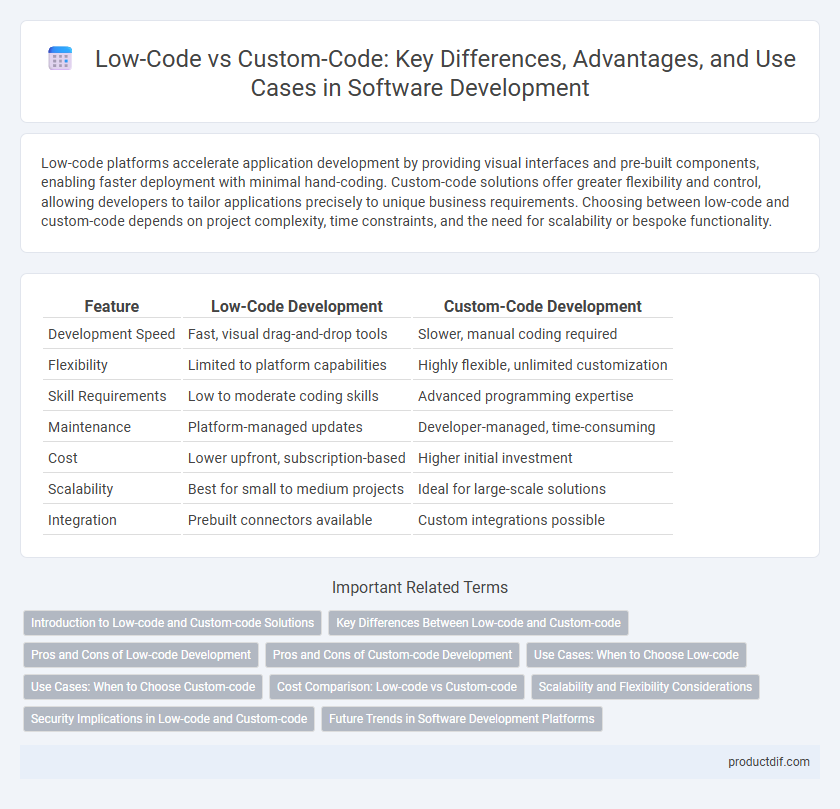Low-code platforms accelerate application development by providing visual interfaces and pre-built components, enabling faster deployment with minimal hand-coding. Custom-code solutions offer greater flexibility and control, allowing developers to tailor applications precisely to unique business requirements. Choosing between low-code and custom-code depends on project complexity, time constraints, and the need for scalability or bespoke functionality.
Table of Comparison
| Feature | Low-Code Development | Custom-Code Development |
|---|---|---|
| Development Speed | Fast, visual drag-and-drop tools | Slower, manual coding required |
| Flexibility | Limited to platform capabilities | Highly flexible, unlimited customization |
| Skill Requirements | Low to moderate coding skills | Advanced programming expertise |
| Maintenance | Platform-managed updates | Developer-managed, time-consuming |
| Cost | Lower upfront, subscription-based | Higher initial investment |
| Scalability | Best for small to medium projects | Ideal for large-scale solutions |
| Integration | Prebuilt connectors available | Custom integrations possible |
Introduction to Low-code and Custom-code Solutions
Low-code platforms accelerate application development by providing visual interfaces and pre-built components, enabling users with minimal coding skills to create functional software quickly. Custom-code solutions involve writing detailed, tailor-made code, offering greater flexibility and control for complex or unique business requirements. Choosing between low-code and custom-code depends on project scope, timelines, scalability needs, and resource availability.
Key Differences Between Low-code and Custom-code
Low-code platforms enable rapid application development through visual interfaces and pre-built components, significantly reducing the need for extensive programming knowledge, while custom-code requires writing detailed, hand-coded scripts tailored to specific business needs. Low-code solutions offer faster deployment and easier maintenance, whereas custom-code provides greater flexibility and control over functionality and scalability. The choice between low-code and custom-code depends on project complexity, resource availability, and long-term customization requirements.
Pros and Cons of Low-code Development
Low-code development accelerates application creation through visual interfaces and pre-built components, significantly reducing time-to-market and enabling non-developers to contribute. However, low-code platforms often impose limitations on customization, resulting in potential scalability issues and difficulties integrating complex business logic. Organizations must weigh the trade-offs between faster deployment and the flexibility offered by traditional custom-code approaches to select the best fit for their software needs.
Pros and Cons of Custom-code Development
Custom-code development offers unparalleled flexibility and control, enabling tailored software solutions that precisely meet unique business requirements. However, it demands significant time, advanced programming skills, and ongoing maintenance, which can increase costs and delay deployment. Despite these challenges, custom-code provides scalability and integration capabilities that low-code platforms often cannot match for complex or large-scale applications.
Use Cases: When to Choose Low-code
Low-code platforms are ideal for rapid application development, especially in automating routine business processes, creating internal tools, and enabling non-technical users to contribute to software creation. Organizations seeking quick deployment with limited IT resources benefit significantly from low-code solutions, as they reduce dependency on specialized developers. When projects require frequent iteration, agile scaling, or integration with existing systems without complex customization, low-code offers an efficient, cost-effective alternative to custom-code development.
Use Cases: When to Choose Custom-code
Custom-code is ideal for complex software solutions requiring high customization, unique business logic, and integration with legacy systems that low-code platforms cannot support. It offers greater flexibility for enterprise applications demanding scalability, security, and performance optimization tailored to specific organizational needs. Organizations handling sensitive data, extensive workflows, or proprietary algorithms benefit most from custom development over low-code alternatives.
Cost Comparison: Low-code vs Custom-code
Low-code development platforms significantly reduce upfront costs by minimizing the need for extensive coding expertise, enabling faster deployment and lower labor expenses compared to custom-code solutions. Custom-code projects often incur higher costs due to prolonged development timelines, specialized developer requirements, and ongoing maintenance complexities. Businesses seeking cost efficiency benefit from low-code environments that streamline workflows and reduce total cost of ownership relative to traditional custom-code approaches.
Scalability and Flexibility Considerations
Low-code platforms offer rapid development with built-in scalability features suitable for standard business applications but may face limitations when handling complex, large-scale enterprise systems requiring high flexibility. Custom-code solutions provide maximum scalability and flexibility by allowing tailored architecture and performance optimizations, essential for unique, evolving business needs and integration with diverse systems. Scalability in custom code depends heavily on developer expertise and infrastructure, while low-code scalability relies on platform capabilities and vendor support.
Security Implications in Low-code and Custom-code
Low-code platforms often incorporate built-in security features, such as automated patching and standardized compliance protocols, reducing vulnerabilities inherent in custom-code development. Custom-code allows for more tailored security controls but requires extensive expertise to avoid introducing risks through coding errors or inconsistent policy enforcement. Organizations must weigh the accelerated deployment benefits of low-code against the detailed security customization possible with custom-code, ensuring rigorous testing and monitoring regardless of the approach.
Future Trends in Software Development Platforms
Low-code platforms are rapidly evolving to incorporate AI-driven automation and increased integration capabilities, reducing development time and expanding accessibility for non-technical users. Custom-code development remains essential for highly specialized applications requiring granular control and unique functionality, ensuring scalability and performance in complex environments. The future of software development platforms lies in a hybrid approach that leverages low-code agility with custom-code flexibility to meet diverse business demands efficiently.
Low-code vs Custom-code Infographic

 productdif.com
productdif.com